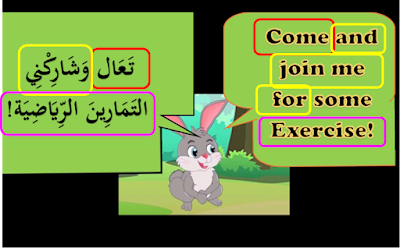Assalaamu Alaykum Everyone
Ahlan wa Sahlan! Hello & Welcome!
Please join us and
Have Fun Learning Arabic with Short Animated Videos

Please read the Introduction
1. In this lesson the Arabic numbers (cardinal numbers) from one to four are covered:
The numbers 0-10 are as follows:
(This page is from Enjoy Arabic - Book One, page 87)
The following short notes should assist in understanding the text/ what is said:
2. Mushaakis wonders: "Isn't that the voice of Arnuub?"
(أَلَيسَ هَذَا) literally means: Isn't this
(صَوْتَ أَرْنوب) = the voice of Arnuub
The sentence: (أليس هذا صوت أرنوب؟) - "Isn't this the voice of Arnuub?"
is in the negative form, due to the verb ليس [laysa].
The positive question is: (أَهَذَا صَوْتُ أَرْنُوب؟) : "Is that (this) the voice of Arnuub?"
3. "What is he doing there?"

(مَا الذِي) = what (is it which)
(يَفْعَلُهُ) = he is doing (it)
(هُنَا) = literally here.
"What is it that/ which he is doing (it) here?"
A simpler form of this question would have been:
(مَاذَا يَفْعَلُ هُنَا؟) = [Maathaa yaf 'alu hunaa?]
"What is he doing here?"
Remember: By giving a simpler or alternate form, I'm not in any way trying to suggest that the sentence or phrase I'm giving would be a better alternative. It is merely given as an alternate, simpler form to facilitate how Arabic sentences are structured. We must remember that the spoken language is more about natural or idiomatic expression than formal grammatical structure. This is also partially true with Spoken Fushah (Pure Arabic). Having said this, I'm not suggesting that there is anything wrong with the grammatical structure of these sentences.
4. "It looks funny"
(يَبْدُو) = it looks/ it seems
(مُضْحِكًا) = funny
If he thought: "This is funny" or "It is funny."
The Arabic would have been:
(هَذَا مُضْحِكٌ or هُوَ مُضْحِكٌ)
5. "What are you doing, Arnuub?"
(ما الذي) = what (is it that/which)
(تَفْعَلُهُ) = you are doing (it)
(يَا أَرْنُوب) = literally: Oh, Arnuub
Once again: He could have said: (مَاذَا تَفْعَلُ، يا أرنوب؟)
"What are you doing, Arnuub?"
6. Arnuub greets Mushaakis: "Hello Mushaakis"
(أَهْلًا) = Hello/ Hi there/ Welcome!
Often this expression is extended to:
(أَهْلًا وَسَهْلًا) or even (أَهْلا وسهلا ومَرْحَبًا) or just (مَرْحَبًا)
with the same meaning.
7. Arnuub then invites Mushaakis to participate with him:
"Come and join me for some exercise."
(تَعَالَ) = Come!
(وَشَارِكْنِي) = and join me/ and participate with me
(التمارين الرياضِية) = physical exercise
8. Mushaakis is amused by this:
"Should I join you for some exercise?"
(أَنَا) = I, meaning: Should I...
(أُشارِكُك) = literally: participate with (كَ) you
9. Arnuub replies very seriously:
"Yes, of course you, Mushaakis!"
(أَجَل) = Yes,of course
(أنْتَ) = you (m)
(يَا مُشَاكِس) = Literally: Oh, Mushaakis.
Arnuub could have said (نَعَم) = "Yes.",
but that would have been less assertive.
10. Noticing that Mushaakis is amused by that, he asks:
"What's wrong with that?"
(ما) = what
(المانع) = wrong. Literally: the preventing factor/ inhibitor/ obstruction
(في ذلك) = literally: in (doing) that.
The expression: (لاَ مَانِعَ عَنْ ذَالِك) means:
"Nothing prevents (me/ you, etc) from (doing) that."
11. He then states:
"Everyone needs exercise!"
(الكل) = everyone/ everybody. Literally: the whole (group)
(بحاجة إلى ) = literally: (is) in need of
- the verb to be (is, are, am, etc. is not used in these kind of (nominal) sentences.
(الرياضة) literally: the exerciseز
Shukran
Enjoy!
















No comments:
Post a Comment